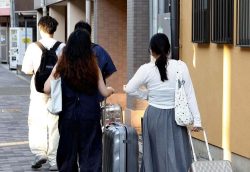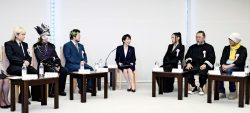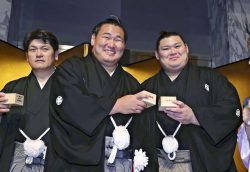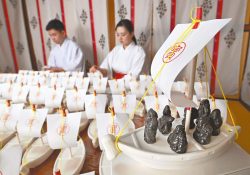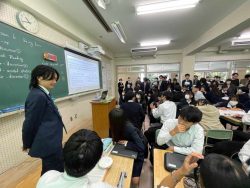In International Education Study, Japan Strong after Ending Its ‘Pressure-free’ Policy
16:37 JST, December 17, 2020
It has been proved again that Japanese children have a high level of academic achievement in science and mathematics by international standards. Rather than simply taking satisfaction in the findings, it is important to thoroughly examine the challenges that remain and make use of them for future teaching.
The findings of an international study to measure the academic achievement of fourth-grade elementary school students and second-year junior high school students in mathematics and science have been released. The Japanese elementary and junior high school students both ranked fifth or higher in the world in every subject. The rates of children who said they liked learning these subjects also reached record highs, according to the findings.
The study is conducted every four years. The latest results come from an assessment carried out in 2019. The Japanese students who took part in the latest study have experienced increases in both the volume of study content and the number of class hours since their first year of elementary school, in the government’s shift away from its “pressure-free education” policy. Japanese students also maintained high positions in mathematics and science in a different assessment conducted by the Organization for Economic Cooperation and Development.
The findings in the latest international study are apparently the fruit of reviewing the official teaching guidelines and improving teaching methods with an aim to boost children’s academic achievement.
Yet there are also a number of items of concern.
The average score for science among the Japanese fourth-grade elementary school students dropped from the previous study. The Japanese second-year junior high school students showed lower rates compared to international averages in terms of attitudes for making use of math and science knowledge in daily life, as well as for taking advantage of such knowledge in their future careers.
The Education, Culture, Sports, Science and Technology Ministry should not only look into the reasons and backgrounds behind these trends, but also find creative ways to encourage students to connect learning and daily life.
Japanese students again showed their tendency to not perform well on questions that called for descriptive answers. There is concern that Japanese children’s reading comprehension has been declining, and it is also pointed out they lack the ability to write. It is necessary to make active efforts to develop these abilities so that the overall level of academic achievement can be raised.
The ability to read and comprehend sentences, think deeply and write one’s own opinions cannot be acquired overnight. With the spread of social media, it is said that children exchange short texts more frequently, while having fewer opportunities to read and write long texts.
It is essential to continue steady efforts to teach students how to read and write from elementary school through junior high school and high school.
In recent years, Singapore, South Korea and Taiwan, among other participants in the international study, have shown outstanding academic achievements. Russia has also improved its scores.
In the 2020 school year, Japan has started the full-fledged introduction of “active learning” in stages at primary, junior high and high schools, an approach that encourages independent, interactive and deep learning by focusing on discussions and presentations. It is hoped that the government will make steady efforts to promote this approach, while having flexible attitudes on adopting education policies from overseas if they have aspects that Japan should learn from.
In Japan, there is a strong tendency for educators to use insubstantial indicators when describing achievements in children’s learning, such as “They have more smiles” or “Their eyes are sparkling.”
An international study like the latest one can provide an important opportunity to see — through specific figures — the actual level of Japanese children’s academic achievement and the areas in which they can or cannot perform well. It is important not to react to the findings of every study, but to accumulate data from a long-term perspective and use it for constant reviews of the nation’s education system.
— The original Japanese article appeared in The Yomiuri Shimbun on Dec. 16, 2020.
"Editorial & Columns" POPULAR ARTICLE
-

Violations of Subcontract Law: Major Automakers Must Eliminate Old Practices
-

Local Governments’ Tax Revenues: Devise Ways to Correct Imbalances in Tax Sources
-
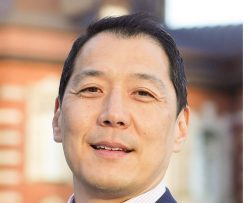
5 Japanese Business Dinner Mistakes to Avoid — and What They Taught Me About Business in Japan
-

Heavy Rains in Asia: Support for Victims, Flood-Control Measures Urgently Needed
-

Rice Coupons: A Misguided Approach to Countering Rising Prices
JN ACCESS RANKING
-

Tokyo Economic Security Forum to Hold Inaugural Meeting Amid Tense Global Environment
-

Keidanren Chairman Yoshinobu Tsutsui Visits Kashiwazaki-Kariwa Nuclear Power Plant; Inspects New Emergency Safety System
-

Imports of Rare Earths from China Facing Delays, May Be Caused by Deterioration of Japan-China Relations
-

University of Tokyo Professor Discusses Japanese Economic Security in Interview Ahead of Forum
-

Japan Pulls out of Vietnam Nuclear Project, Complicating Hanoi’s Power Plans


